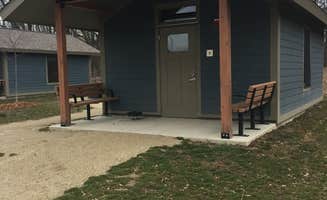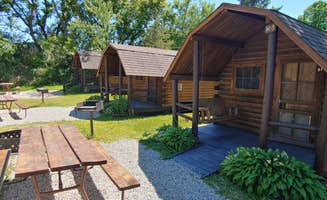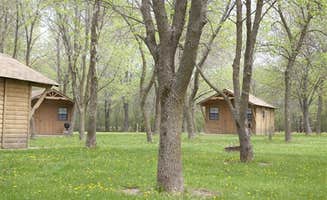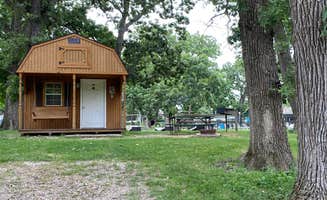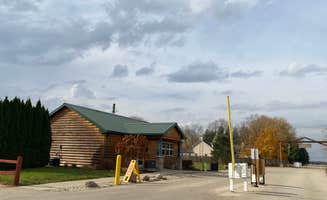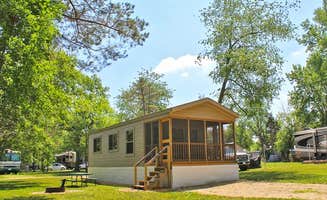Camp Bullfrog Lake and Camp Reinberg provide year-round cabin accommodations within 30 minutes of Elmhurst, making weekend getaways accessible without extensive travel. Both locations are situated in Cook County Forest Preserves at elevations between 600-700 feet above sea level. Winter cabin camping remains viable with temperatures typically ranging from 20-40°F between November and March, while summer cabin stays often contend with humidity levels above 70%.
What to do
Hiking trails access: Camp Bullfrog Lake features direct access to miles of mountain biking and hiking trails from cabin sites. "What's great about this location is the access to the miles and miles of MTB and hiking trails just out the front step of your campsite," notes a regular visitor at Camp Bullfrog Lake.
Wildlife viewing: Chain O' Lakes State Park cabins provide good positioning for wildlife spotting along the waterways. "I've seen beavers, minks, ferrets, and sand cranes on my two trips so far," reports a kayaker at Turner Lake South within the park.
Fishing opportunities: Multiple stocked lakes near cabin sites allow shore fishing without boat rentals. "The lake is beautiful. We did some fishing from the shore," mentions a visitor to Shabbona Lake, where cabins provide overnight accommodation near prime fishing areas.
Kayak excursions: Rental options available at several locations allow water exploration from $15 per hour. According to a cabin camper, "The kayaks are $15 an hour and include life vests. The lake is pretty small but it was fun to putter around."
What campers like
Clean facilities: Many cabin sites maintain well-kept bathroom facilities with hot water. A camper at Camp Reinberg noted, "Lovely campground north west of Chicago. The shower facilities were clean and the staff very friendly."
Proximity to urban amenities: Cabin locations balance nature access with convenience to shopping. "It's a short trip to get groceries or whatever you need in Palatine, but there's also a little camp store," explains a camper who appreciates the balance of isolation and access.
Year-round comfort: Several cabin options offer heating systems for cold-weather camping. "There are small and medium cabins, some heated with their own bathrooms, that feature bunk beds and are great for getting out of the cold," shares a spring visitor to Camp Bullfrog Lake.
Free firewood: Select cabin sites include complimentary wood with reservations. "Each site comes with a free bundle of oak firewood which is nice to use on the fire pits," notes a camper about the value-added amenity at some locations.
What you should know
Limited privacy: Cabin sites at most locations offer minimal separation between units. At Camp Sullivan, a visitor observed, "The campsites are TINY. We were in a modest pop up and still felt crowded."
Seasonal operation variations: Several campgrounds adjust operating hours based on season. A Fish Lake Beach Camping Resort visitor noted, "We stayed in one of the tent sites across the road from the lakefront sites. There are about 8 tent/pop up sites and the rest of the campground is for RVs."
Gate closing times: Security measures include locked entrances after certain hours. "They lock the gates (both of them!) to the campground with a PADLOCK at night until 7 in the morning!" reported a camper who needed staff assistance for early departure.
Wildlife encounters: Cabin campers should prepare for raccoon activity, especially at dusk. "The raccoons at night here are no joke. The second it's dusky, they come scavenging for absolutely anything food has touched," warns a camper who suggests packing all food items in vehicles overnight.
Tips for camping with families
Budget-friendly options: State park cabin sites offer economic alternatives to private campgrounds. "These campsites are as low as $12/night!! One of my favorite spots to test new gear. Family friendly," reports a visitor to Turner Lake South.
Activity centers: Some cabin locations feature recreation facilities beyond standard campground amenities. "There is an activities barn with a rock climbing wall. There are smaller family cabins with heat available to rent as well as large bunkhouses for organized groups," explains a family who appreciated the additional entertainment options.
Insect preparation: Cabin camping families should plan for significant insect activity, particularly ticks. "SO many ticks. With a baby crawling that needed to be set free, we were constantly doing checks," cautions a parent who recommends contained screen houses for young children.
Cabin selection strategy: Families should research specific cabin locations within campgrounds. "For the most part, all of the 30/50 amp sites are very similar. Can't really say one appears to be better than the rest. Sites # 4 and 5 probably have the longest length parking pad."
Tips from RVers
Water access limitations: Several cabin and RV sites have complicated water hookup systems requiring staff assistance. "The staff has to hook up a very very long hose and will bring it to your site. You can get water, it's just an inconvenience for you and them," explains a visitor to Chicago Northwest KOA.
Reservation planning: Peak season requires advance booking, particularly for cabins with amenities. "This campground fills up quickly on the weekends over the summer. The best sites for those hoping for privacy are in Turner Lake South and Mud Lake East."
Electrical connections: Shared utility arrangements may require extension cords at some locations. "These sites share an electric box. Some spaces the box is further than 30 feet from the pad," notes a camper who recommends researching specific site layouts before booking.
Shade considerations: Newer cabin and RV areas often lack mature tree cover. "There is NO shade during the day. None at all due to the trees within the campground being small," explains a summer visitor who suggests planning for direct sun exposure.


